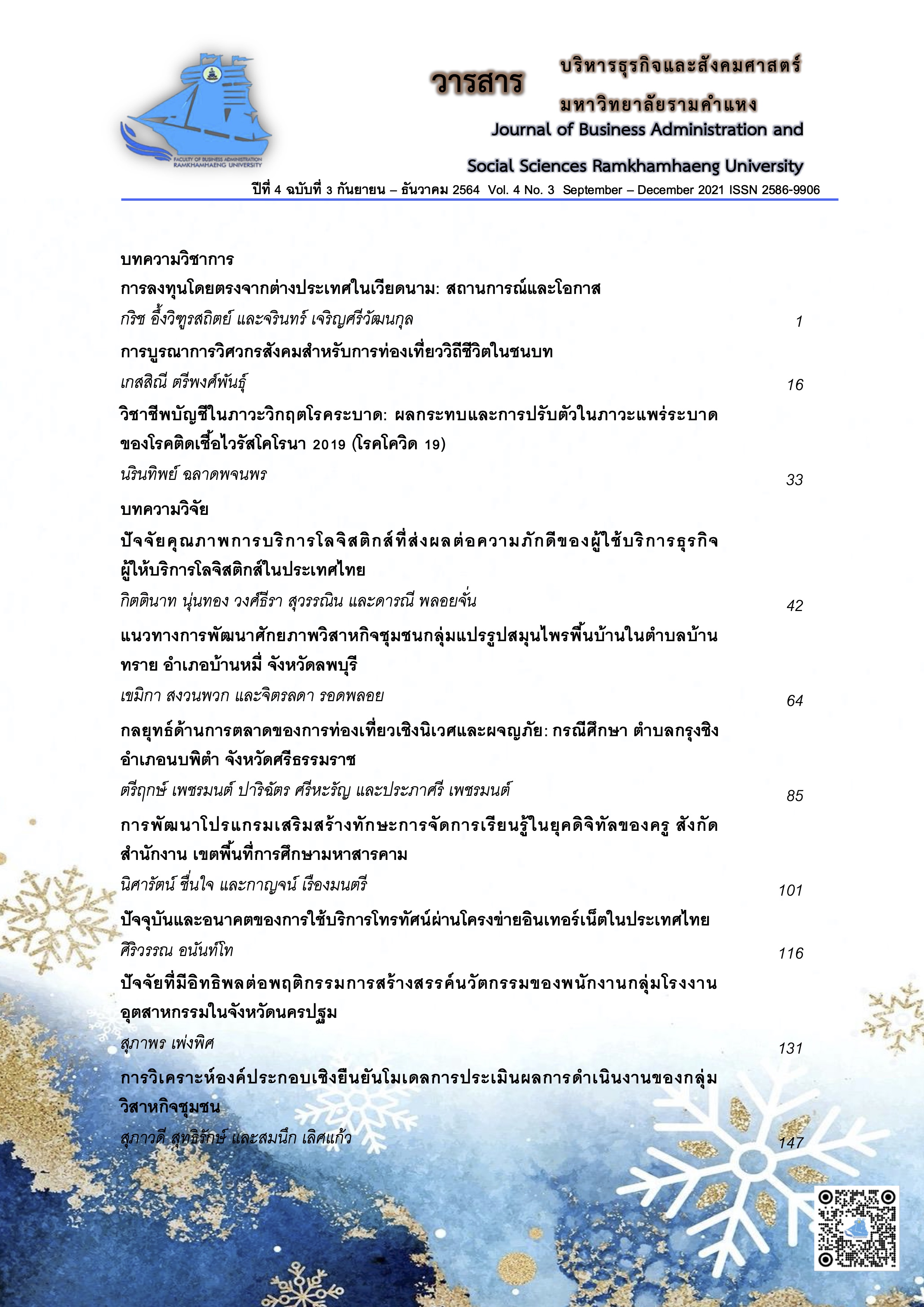Developing a Program to Strengthen Learning Management Skills in Digital Era of Teacher under The Secondary Education Service Area Office Mahasarakham
Main Article Content
Abstract
The purposes of this study were: 1) Study current conditions, desirable conditions and the needs to strengthen learning management skills in digital era of teacher under the secondary education service area office Mahasarakham and 2) Develop a program strengthen learning management skills in digital era of teacher under the secondary education service area office mahasarakham. The research method was divided into 2 phases. Phase 1 was to study current conditions, desirable conditions, needs to strengthen learning management skills in digital era of teacher. The samples were 320 school administrator, academic head, and teachers under the secondary education service area office mahasarakham through stratified random sampling technique and research instrument was scaling questionnaire. Data were analyzed by using percentage, mean, standard deviation and modified priority index.Phase 2 was to develop a program to strengthen learning management skills in digital era of teacher.The target group were 1 administrators and were 4 teachers with best practices and 5 experts through purposive sampling technique and an assessment of appropriateness and feasibility of the program.Data were analyzed by using mean, standard deviation.
The results showed that; 1) The overall picture of current condition learning management skills in digital era of teacher under the secondary education service area office mahasarakham was at moderate level and the desirable condition of learning management skills was at the highest level. The necessity assessment to the development which ordered of the needs assessment from more to less were Information and Communication Technology Skill, Classroom Management Skill, Learning Management Design Skill, Measurement and Evaluation Skill. 2) Program to strengthen learning management skills in digital era of teacher under the secondary education service Area office mahasarakham. The results of overall program evaluation were high level appropriate and the possibilities are at the highest level.
Article Details
เนื้อหาและข้อมูลในบทความที่ลงตีพิมพ์ในวารสารบริหารธุรกิจและสังคมศาสตร์ มหาวิทยาลัยรามคำแหง ถือเป็นข้อคิดเห็นและความรับผิดชอบของผู้เขียนบทความโดยตรง ซึ่งกองบรรณาธิการไม่จำเป็นต้องเห็นด้วย หรือร่วมรับผิดชอบใดๆ
บทความ ข้อมูล เนื้อหา รูปภาพ ฯลฯ ที่ได้รับการตีพิมพ์ในวารสารบริหารธุรกิจและสังคมศาสตร์ มหาวิทยาลัยรามคำแหง ถือเป็นลิขสิทธิ์ของวารสารบริหารธุรกิจและสังคมศาสตร์ มหาวิทยาลัยรามคำแหง หากบุคคลหรือหน่วยงานใดต้องการนำบทความทั้งหมดหรือส่วนหนึ่งส่วนใดไปเผยแพร่ต่อ หรือเพื่อกระทำการใดๆ จะต้องได้รับอนุญาตเป็นลายลักษณ์อักษรจากวารสารบริหารธุรกิจและสังคมศาสตร์ มหาวิทยาลัยรามคำแหง ก่อนเท่านั้น
References
บุญชม ศรีสะอาด. (2553). การวิจัยเบื้องต้น (พิมพ์ครั้งที่ 8). กรุงเทพฯ: สุวีริยาสาส์น.
พิมพ์พันธ์ เดชะคุปต์ และพเยาว์ ยินดีสุข. (2557). การจัดการเรียนรู้ในศตวรรษที่ 21. กรุงเทพฯ : โรงพิมพ์จุฬาลงกรณ์มหาวิทยาลัย.
ลำยวน ไวทำ. (2562). โปรแกรมพัฒนาสมรรถนะครูด้านการจัดการเรียนรู้ที่เน้นการคิดวิเคราะห์ในสถานศึกษา สังกัดสำนักงานเขตพื้นที่การศึกษามัธยมศึกษาเขต 26. วิทยานิพนธ์การศึกษามหาบัณฑิต, มหาวิทยาลัยมหาสารคาม.
วิจารณ์ พานิช. (2555). วิถีสร้างการเรียนรู้เพื่อศิษย์ในศตวรรษที่ 21. มูลนิธิสดศรี-สฤษดิ์วงศ์ : กรุงเทพฯ.
สุกัญญา แช่มช้อย. (2562). การบริหารสถานศึกษาในยุคดิจิทัล = School Management in Digital Era(พิมพ์ครั้งที่ 2). กรุงเทพฯ: สำนักพิมพ์แห่งจุฬาลงกรณ์มหาวิทยาลัย.
สุริยาพร นพกรเศรษฐกุล. (2561). ทักษะการจัดการเรียนรู้ในศตวรรษที่ 21 ของครูโรงเรียนมัธยมศึกษาจังหวัดระยอง สังกัดสานักงานเขตพื้นที่การศึกษามัธยมศึกษา เขต 18. วิทยานิพนธ์การศึกษามหาบัณฑิต, มหาวิทยาลัยบูรพา.
สำนักงานเขตพื้นที่การศึกษามัธยมศึกษามหาสารคาม. (2563). นโยบายสำนักงานเขตพื้นที่การศึกษา มัธยมศึกษามหาสารคาม. สืบค้นจาก http://ses26.go.th/.
อาภรณ์ ภู่วิทยพันธ์. (2559). การพัฒนาขีดความสามารถของบุคลากรบนพื้นฐาน 70:20:10 Learning Model. กรุงเทพฯ: เอช อาร์เซ็นเตอร์.
Cooper, M. J. (2011). Classroom Teaching Skills. Belmont: Wadsworth Cengage Learning.
Hague, C., & Payton, S. (2010). Digital literacy across the curriculum. Bristol: Futurelab.
Krejcie, R. V., & Morgan, D. W. (1970). Determining sample size for research activities.
Educational and psychological measurement, 30(3), 607-610.
Lombardo, M. M., & Eichinger, R. W. (1996). FYI: For your improvement: a guide for development
and coaching. The Leadership Architech Suites. MN: Lominger.
Özgür, H. (2021). Improving Teachers’Qualifications for Preparing ICT Based Educational
Materials. Malaysian Online Journal of Educational Technology, 9(1), 48-69.

